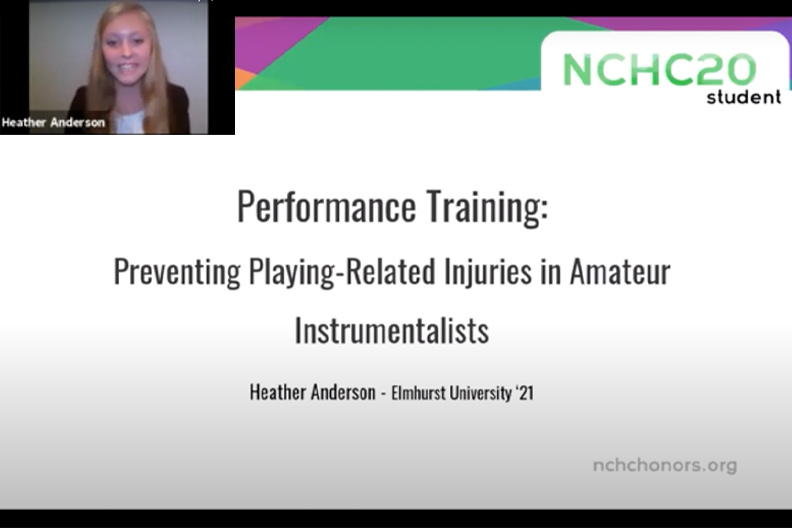
A screenshot of Elmhurst senior Heather Anderson presenting her research at the National Collegiate Honors Council Conference.
Despite the challenges posed by the COVID-19 pandemic, Elmhurst University students took advantage of several opportunities during the Fall Term for academic engagement beyond the classroom.
Two students saw their research article published in a highly respected journal. Several more gave video presentations of their research during this year’s National Collegiate Honors Council Conference. And seven students served as delegates at a virtual version of the annual Model United Nations conference.
Publication in the Journal Intersect
After working on a Creative and Scholarly Endeavors (CASE) project that explored the intentions and moral impacts of criminal incarceration, Aasiyah Wasif ’21 and Aleksandra Graf ’22 were looking to present their research at a conference this past spring. Then the pandemic shut everything down.
So their faculty mentor, philosophy professor Katrina Sifferd, encouraged them to submit their work to an academic journal. Wasif and Graf applied to several, but found that many of the journal sites had shut down or stopped accepting applications, again due to the pandemic.
Their article, “The Impact of Incarceration on Moral Agency,” ultimately was selected by the peer-reviewed academic journal Intersect: The Stanford Journal of Science, Technology, and Society, and was published in October.
“We were really excited about getting our work published, especially considering we’d waited so long,” Wasif said. In an email thanking Sifferd for her help, the students wrote, “Working on this article has genuinely been one of the best experiences of our educational careers.”
National Collegiate Honors Council Conference
Earlier this fall, five Honors Program students had to pivot when they learned that the National Collegiate Honors Council Conference in Dallas, where they were supposed to present their projects, would be held virtually instead.
The students worked quickly to shift their poster presentations, which laid out their topics and research, into full-blown video presentations that were then uploaded and shared remotely with conference attendees.
Music education major Heather Anderson ’21 presented a literature review of research from the past 10 years on performance-related injuries among instrumental musicians. After suffering a playing-related injury herself, she had become passionate about researching the topic, not just for herself but also to “shine a light on best practices” and prevent similar injuries in other students. She hopes to continue her research after she graduates and becomes a music educator.
At the NCHC conference, she gave her oral presentation along with other researchers during a Student Interdisciplinary Research Panel. One advantage to pre-recording her presentation was that she was free to check out other presentations during the conference.
“My big takeaway was realizing the amount of information and research taking place, not just by students but also faculty,” she said. “It helped me see where I am now and where I could be.
“It would’ve been fun to be there in person, but it was still cool to be able to see what’s out there, and to see everyone’s resilience in deciding to go ahead,” she added. “In the end, it was worth the effort.”
The other student presenters were:
- Ioannis Mastoras ’21, “Estimate Pi by Tossing Polygons”
- Courtney O’Donnell ’21, “Changes in Glutamate Receptor Expression in C. Elegans Following Exposure to Inflammatory Cytokines”
- Wasay Sharif ’21, “The Changes in Amino Acids of the Complementarity-Determining Regions of an Antibody Alters the Structure of the Frameswork Region”
- Roxanne Siuda ’21, “Breaking C-H Bonds with Palladium”
American Model United Nations Conference
Seven students participated in the 2020 American Model United Nations conference in late October, representing the countries of Denmark and Iceland. Usually held in downtown Chicago, the conference was held online this year due to the pandemic.
The students joined different committees that explored a range of topics, including the Israeli-Palestinian conflict, nuclear disarmament, digital privacy, global food shortages and human rights. After researching their topic and their country’s position, they spoke on the issue as diplomats, and worked with other delegates to write resolutions addressing the issue, said their faculty advisor, Assistant Professor of Political Science Timothy Hazen. First-year student Matthew Ossmann won a Best Delegate Award for his representation of Denmark.
“It was a new challenge to navigate Model UN in a virtual environment, but I was pleasantly surprised with how well the conference ran, and I was very proud of our students, all seven of whom were doing this for the first time,” Hazen said.